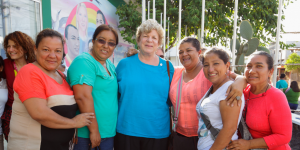
07 Mar My Personal Love Affair with Mathematics Teaching
By Linda Gojak
I always wanted to be a teacher. As a youngster I would come home from school and set up my own classroom in the basement. There was a big table and a blackboard on the wall. My stuffed animals were my students, and I was the teacher. I would make up quizzes (and take them on behalf of my students) and then grade them.
I loved math! As a student in elementary school, I couldn’t wait for math class. I was never selected to be on a team when we split up in gym class. I was a klutz! When it came to teams for a mathematics competition, I was often chosen first. I was good at math. I understood what was going on. Then in ninth grade I took Algebra 1. For the first time in my life, I hated math. Why? All those letters and now negative numbers made absolutely no sense to me. I barely passed that course.
Chapter Two
Fast forward many years. I had been teaching fifth grade for six years and decided to get my master’s degree as a K-8 mathematics specialist. I then realized that even if I understood the why of the mathematics, that didn’t mean I knew how to apply it. Even if I could explain the mathematical reasoning behind when you divide two fractions you “invert and multiply,” I didn’t understand what it really meant in a real-world situation. My teaching changed because my understanding changed.
I found a position in which I taught only fifth- and sixth-grade mathematics. I rediscovered my passion for mathematics, and I rocked it! My students became excited about learning math as they grew to realize that math was more than just following a set of random steps. The definition of learning changed from a focus on simply getting the right answer to using strategies that made sense.

Linda (center) with math teachers in the Galápagos Islands.
Teaching the World
I later had the opportunity to travel with a team to Santa Avelina in the highlands of Guatemala to observe math classes and work with teachers and students. It was life-changing to see a culture and living conditions so different from my own. Watching the smiling faces of the kids as we worked with fraction bars and played games to develop understanding (even though I spoke no Spanish) reinforced that mathematics is a universal language and the key to opening many opportunities.
As Mathkind came into being, I have traveled all over Central America, working with teachers, not as the “expert,” but learning as much from them as I hope they learned from me. It has been an incredible experience.
After a 40-year career in mathematics education, my mantra remains,
Everything you do in mathematics should make sense.
If we truly believe this and can apply it to our learning and teaching, all kids will have the opportunity to be successful in mathematics—and the window to the world will open for them!
No Comments